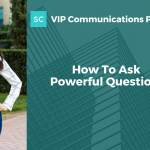How To Engage In Authentic Small Talk
Taking the initiative to speak up doesn’t only need to happen in meetings. In fact, engaging in small talk is a great way to build rapport. But a lot of people say that they get stuck whenever they ask the question, how are you?
This is because most of the time the other person will only respond with the word, good.
The truth is, small talk is an important skill. It can help you as you network and while interacting with people within your company. Knowing how to engage in authentic small talk will help advance your career success.
We’ve found three strategies you can use to improve your small talk skills.
1. Ask Smart Questions
In order to avoid getting one-word answers, you will want to ask questions that can’t be answered with one word. Sounds simple enough, right?
If you find yourself asking a question and the person responds with a one-word answer, think about what else you can ask.
For example, let’s say that you are at a networking (in-person or remote) event. You’ve started engaging in small talk with someone that you are very interested to know more about.
You start by asking the question, how are you?
They respond with, I’m good.
At this point, it may be more difficult to continue the conversation with them. A one or two-word answer leaves less room for follow-up questions. However, think about what else you can ask them that would require a more elaborate response.
For example, you could follow up by asking:
What brought you to this event?
How is that project you’ve been working on?
Do you have any plans over the weekend?
The beauty in asking smart questions is that it also allows you to share a bit about yourself. You can show some personality through answering and responding to questions.
For example, you can share your thoughts about where they are going over the weekend. You can also talk about what brought you to this networking event.
Asking smart questions can also improve your Executive Presence and help you be seen as a leader at work.
Remember, the key to asking smart questions is to ask questions that require the person to elaborate with more than one word. And don’t forget – people, in general, like to talk about themselves. So when you can ask a pointed question about them, such as what their role in that amazing project entailed, you are more likely to get a longer answer. And with longer, more elaborate answers, you are able to engage in authentic small talk.
2. Power Words
Another way to engage in authentic small talk is using power words. Power words are often linked to marketing, but they’re also extremely useful when engaging in authentic small talk.
Power words are strategic words that evoke an emotional, psychological, or cognitive reaction.
Think about all of the power words you see on a daily basis. You may not even realize you are reading them. When you use power words in conversations you are evoking an emotion in the hopes of having a more in-depth conversation.
 Examples of power words include:
Examples of power words include:
- Excited – I was really excited about this
- Frustrated – That project made me really frustrated
- Soaring – Our sales team is soaring past their Q1 goals.
- Massive – We saw massive improvement once we implemented this new system.
Whenever you use power words, it unconsciously perks up the other person’s ears and makes them want to engage with you more.
3. Be Present
In order to truly engage in authentic small talk, you have to be present. This means treating each and every conversation as an opportunity. This means being present.
 You can show you are being present with your body language, listening, and getting rid of distractions.
You can show you are being present with your body language, listening, and getting rid of distractions.
Body Language – Whether you cringe at small talk or enjoy it, your body language will give away your true feelings if you aren’t careful. This means making sure you are maintaining eye contact with the person when they are speaking. If you’ve asked smart questions and used power words, the person should be responding with more elaborate answers. Don’t suddenly lose interest! Stand up straight and keep your arms relaxed. Remember, you want to continue the conversation and engage authentically.
Listening – When you ask a smart question are you actively or passively listening to their response? You can’t just ask and tune out what the other person is saying. That is not engaging authentically. Make sure you are actively listening. This means you are acknowledging the other person, with your body language such as nodding and remembering what they said. When you actively listen you are able to respond in a way that shows you’re listening. For example:
- You can paraphrase what they said
- You can comment on something that they said
- You can ask them to clarify
- You can ask a question that digs further into what they just said
Distractions – Put your phone away and get rid of all distractions. If you are engaging in small talk, you most likely haven’t built up enough rapport to engage while being on your phone. Save that for when you are with your best friends.
The beauty in engaging in small talk is that you can develop rapport with those you are conversing with. The key is to ask smart questions and use power words in your conversation.
__
Whenever you’re ready, there are 3 ways we can help you:
- Discover your communications style so you know where to start. Over 4,000 people have found theirs here.
- Attend our monthly communication workshop to build communications confidence (new topics: public speaking, advocating for yourself, building credibility, etc) here.
- Get your brand in front of 43k+ people by sponsoring our newsletter or Soulcast Media | LIVE LinkedIn events [contact: hello@soulcastmedia.com]











